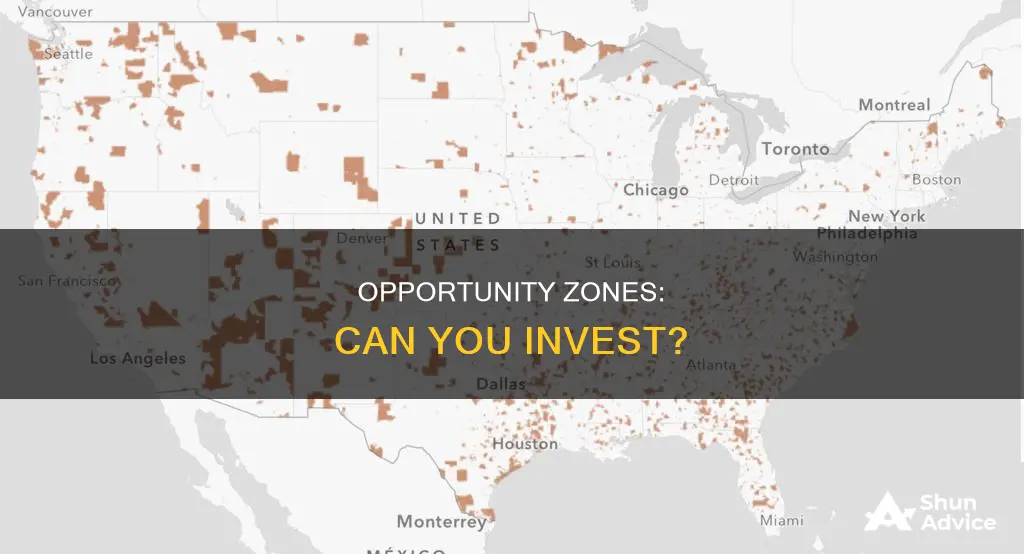
The 2017 Tax Cuts and Jobs Act established Qualified Opportunity Funds (QOFs) to encourage investment in economically distressed communities. Individuals can invest in QOFs to defer and reduce their tax liability on capital gains. These funds invest in real estate and businesses within Qualified Opportunity Zones (QOZs), which are designated by the state and certified by the US Treasury Department. Investors have 180 days from realizing a gain to reinvest it into a QOF and can benefit from a step-up in the tax basis of 10% after five years and an additional 5% after seven years. If the investment is held for over 10 years, there is no tax on the appreciation. However, there are specific requirements for the funds and properties to qualify, and individuals should consult with tax and financial advisors before investing.
What You'll Learn

Tax deferral through 2026
Taxpayers can defer their tax payments on prior investment gains if those gains are then invested in a qualified opportunity fund within 180 days after the sale. Taxes are then deferred to either the day when the opportunity fund investment is sold or exchanged, or December 31, 2026—whichever comes first.
The amount of time you hold the qualified opportunity fund investment determines the tax benefit you receive. When you make an election to defer the gain, the basis in the qualified opportunity fund investment becomes zero. The qualified opportunity fund basis increases the longer you hold your interest in the fund.
If you hold your investment in the fund for at least 5 years, your basis (the amount of your investment) will increase by 10% of the deferred gain. If you hold your investment in the fund for at least 7 years, your basis will increase by an additional 5% of the deferred gain.
If you hold your investment in the fund for at least 10 years, you may be able to permanently exclude gain resulting from a qualifying investment when it is sold or exchanged. The exclusion occurs if you elect to increase the basis of your qualified opportunity fund investment to its fair market value on the date of the sale or exchange.
A Guide to Investing in Amazon: For Indians
You may want to see also

Step-up in tax basis of 10% or up to 15% of deferred gains
The 2017 Tax Cuts and Jobs Act established the Qualified Opportunity Zone program to incentivise private, long-term investment in economically distressed communities. Investors in these programs are given an opportunity to defer and potentially reduce tax on recognised capital gains.
A Qualified Opportunity Fund is any investment vehicle that is organised as a corporation or partnership for the purpose of investing in Qualified Opportunity Zone property.
A taxpayer who defers gains through a Qualified Opportunity Fund investment receives a 10% step-up in tax basis after five years and an additional 5% step-up after seven years. Thus, to be eligible for the 10% step-up in tax basis, the taxpayer needed to invest by December 31, 2021, and by December 31, 2019, for the additional 5% step-up in tax basis. If the taxpayer holds the investment in the fund for seven years by the end of 2026, they would qualify for the 15% increase in tax basis.
Due to the rule regarding recognition of gain no later than December 31, 2026, the step-up in tax basis benefit was no longer available for new investors from the 2022 tax year.
For example, if a taxpayer sold a zero-basis business for $10 million, resulting in a $10 million capital gain, and invested the entire amount in a Qualified Opportunity Fund within 180 days, none of the sale proceeds would be taxable in 2019. At 2019 federal capital gains rates of 20%, this allowed the taxpayer to keep over $2 million that would otherwise have been taxed as a capital gain and paid in the 2019 tax year. Assuming even a conservative rate of return on that $2 million, it could provide a significant return to the taxpayer over the length of the investment.
After seven years, the taxpayer is given a $1 million basis in the fund (10% of the original capital gain deferred). After seven years, the taxpayer is given another $500,000 basis in the fund (5% of the original capital gain deferred). After seven years, let's say the taxpayer sells the $10 million investment and would pay tax on only $8.5 million of the gain. At current federal capital gains rates, that's a saving of over $300,000 simply for holding the investment for seven years.
Morningstar Inc: Simplifying Individual Investing
You may want to see also

No tax on appreciation
Qualified Opportunity Funds (QOFs) are corporations or partnerships that hold at least 90% of their assets in IRS-designated qualified opportunity zones (QOZs). These zones are economically distressed communities where new investments may be eligible for preferential tax treatment.
If a taxpayer holds their QOF investment for at least 10 years, they may elect to increase the basis of the QOF investment to its fair market value on the date of the sale or exchange. As a result of this basis adjustment, there is no tax on the appreciation of the QOF investment.
For example, if a taxpayer sells a zero-basis business for $10 million in July 2019, resulting in a $10 million capital gain, they can invest the entire amount in a QOF within 180 days. The funds will be invested in the QOF, and even a conservative rate of return on that investment could provide a significant return to the taxpayer over the length of the investment. In 2030, if the taxpayer sells the investment for $15 million, the $5 million in appreciation is not taxable. At current federal capital gains rates, that's a savings of over $1 million.
It's important to note that the rules and regulations for investment in, and taxation of, QOFs can be complex and subject to change. Investors should consult investment and tax professionals before making any decisions.
Private Equity Strategies: Recession-Proof Sectors to Invest In
You may want to see also

No tax on 10% or up to 15% of deferred gains
Qualified Opportunity Zones (QOZs) are economically distressed communities where new investments may be eligible for preferential tax treatment. QOZs were added to the tax code by the Tax Cuts and Jobs Act in 2017.
If you invest in a Qualified Opportunity Fund (QOF), you can defer tax on eligible gains until the earlier of the date on which the investment in the QOF is sold or exchanged, or December 31, 2026. Eligible gains include capital gains and qualified 1231 gains, but they must be recognised for federal income tax purposes before January 1, 2027, and not be from a transaction with a related person.
If you hold your investment in the QOF for at least five years, your basis (the amount of your investment) will increase by 10% of the deferred gain. If you hold your investment for at least seven years, your basis will increase by an additional 5% of the deferred gain.
So, if you hold your investment in the QOF for at least five years, you will pay no tax on 10% of the deferred gain. If you hold your investment for at least seven years, you will pay no tax on 15% of the deferred gain.
Equity Unit Investment Trusts: Unlimited Life or Finite?
You may want to see also

Tax advantages of qualified opportunity funds
Qualified Opportunity Funds (QOFs) are investment vehicles designed to invest in real estate or business development in economically distressed areas known as "opportunity zones". These zones are designated by the state and certified by the secretary of the US Treasury via the Internal Revenue Service (IRS).
QOFs offer investors the following tax advantages:
Deferral of eligible gains
Investors can defer their tax payments on prior investment gains if those gains are then invested in a QOF within 180 days after the sale. Taxes are then deferred to either the day when the QOF investment is sold or exchanged, or December 31, 2026 — whichever comes first.
Step-up in tax basis of 10% or up to 15% of deferred gains
If investors hold their QOF investment for longer than five years, they receive a 10% exclusion of the deferred gain on their investment. If they hold for more than seven years, they receive a 15% exclusion.
No tax on appreciation
If investors hold their QOF investment for at least 10 years, they do not owe federal income taxes on the fund's appreciation by the date of sale.
Unlocking Private Equity: The Benefits of Listed Investments
You may want to see also
Frequently asked questions
A Qualified Opportunity Fund (QOF) is an investment vehicle that is organised as a corporation or partnership for the purpose of investing in Qualified Opportunity Zone property.
To become a QOF, an eligible corporation or partnership elects to self-certify by annually filing Form 8996 with its federal income tax return.
Each qualified opportunity fund facilitates investments into businesses or properties within qualified opportunity zones (QOZs). States can nominate low-income communities (and, perhaps, their surrounding areas) to be designated as opportunity zones, and the nomination must be certified by the U.S. Treasury Department.
A Qualified Opportunity Zone is a community nominated by the state and certified by the Treasury Department as qualifying for this program. The Treasury Department has certified zones in all 50 states, Washington, D.C., and U.S. territories.







